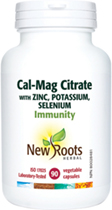Magnesium’s Role in Your Health
Magnesium plays a role in countless body functions. In fact, the essential mineral is the second most prevalent electrolyte in the body after potassium, which should give an indication of its importance.
As adults, we’re home to about 25 g of magnesium, which is about as much as five cubes of sugar and is distributed throughout our entire body. Less than one per cent of that is kept dissolved in our blood, while most is stored in our bones.
According to the most recent information available from Statistics Canada, about 34% of Canadian adults fail to meet their body’s magnesium needs through diet alone. This is a real concern when considering all the varied functions of this mineral in the body.
Traditional food sources of magnesium include leafy greens like spinach, legumes, nuts, seeds, and whole grains. Because of how common deficiency is, many Canadians turn to a magnesium supplement.
Magnesium’s activity can be categorized into three broad categories: contributing to the structure of our bones, serving as a cofactor in over 300 important enzyme reactions, and contributing to nerve and muscle function.
This mineral is most heavily concentrated in the hardened structure of our bones, but its role there is primarily as storage to ensure our body has enough to keep our enzyme systems running smoothly. About 50% of our body’s magnesium is found in our bones.
Magnesium is intimately involved in helping to control bone mineral density. It interacts with several hormones that help strengthen bones, including vitamin D and parathyroid hormone, and helps increase bone formation through influencing the proteins that build bones. Some population-based studies have found that osteoporosis, or low bone-mineral density, is associated with low magnesium levels in the blood. One study found that magnesium supplementation may help to prevent the breakdown of bone in older women with osteoporosis.
One of magnesium’s primary roles is as a cofactor (or assistant) to over 300 enzyme reactions in the body. Magnesium is essential for helping to regulate blood-glucose levels; it’s also involved in producing energy and is essential for building healthy DNA and RNA, the chemical basis of our genes. Maintaining adequate magnesium levels is also important for maintaining healthy blood pressure.
One of the reasons magnesium has been getting so much attention recently is its role in nerve and muscle function. Magnesium is an activator of various protein enzymes that are responsible for helping to reduce inflammation, but all eyes are on it now because of its apparent role in mental health. A recent high-quality, systematic review found that supplemental magnesium helped to reduce symptoms of anxiety in a range of populations. Other research found an association between higher magnesium intake and decreased symptoms of depression. This is a growing area of research as scientists continue to unravel the many roles magnesium plays in the body.
Magnesium is a mineral that’s only growing in popularity. The combination of low levels in our food and the higher requirements of our body make it a crucial supplement. Visit your local CHFA Member health-food store for tips, and speak with your health-care practitioner for any questions you have about supplementing with magnesium.
Tips for Supplementing
As a supplement, magnesium comes in a variety of forms, including oxide, citrate, and chloride. Your body’s absorption of each of these varies slightly: a citrate- or chloride-bound version has been shown to be more readily absorbed in the gut than the oxide form.
It’s important to be aware of your intake if you’re taking multiple mineral supplements. This is because they can compete for the same receptor in your gastrointestinal tract and inhibit absorption. For instance, spread out your intake of zinc, iron, and magnesium supplements to different parts of the day to avoid this competition. Read the instructions on the label of your capsule or other form of supplement, which are often found in 100 to 300 mg doses per day (used in research) and can be paired with vitamin B6.
 Michelle W. Book
Michelle W. Book
A graduate in holistic nutrition and spokesperson for the
Canadian Health Food Association (CHFA), she focuses
on living life and raising a family focused on holistic
health and wellness.

 Stores
Stores


